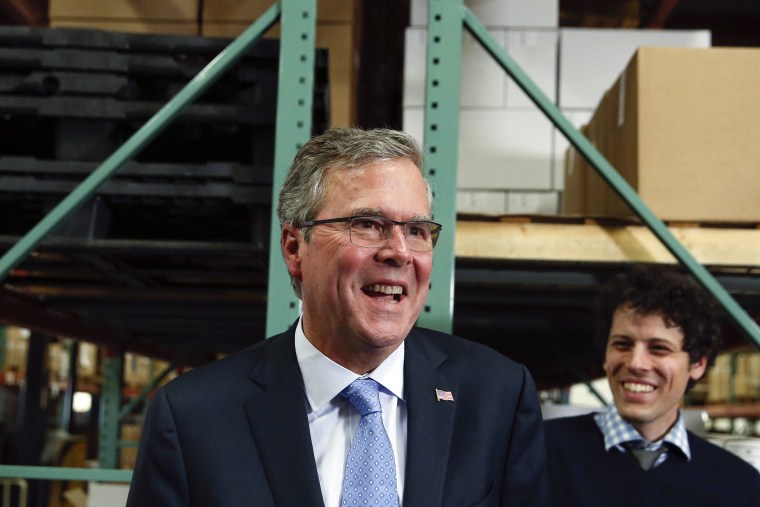It may be tempting to think the nation's campaign-finance system can't get much worse. An under-appreciated
AP story this week, however, suggests the few remaining pillars still standing, trying to maintain some semblance of limits, are starting to look pretty shaky.
The traditional presidential campaign may be getting a dramatic makeover in Jeb Bush's bid for the White House as he prepares to turn some of a campaign's central functions over to a separate political organization that can raise unlimited amounts of money. The concept, in development for months as the former Florida governor has raised tens of millions of dollars for his Right to Rise super PAC, would endow that organization not just with advertising on Bush's behalf, but with many of the duties typically conducted by a campaign.
David Keating, president of the Center for Competitive Politics, told the AP, "Nothing like this has been done before."
And for good reason. In theory, donors have to weigh a variety of considerations before making a contribution: they can donate to a candidate, knowing the money will benefit him or her directly, but there are strict legal caps. They can donate to a party or a party's campaign committee, but the donor has no way of knowing which candidates in which races will get the help.
Super PACs offer appeal -- unlimited funds from anyone, including corporations -- but contributors realize in advance that the super PACs cannot legally coordinate with allied candidates. There's no guarantee the super PACs will make decisions -- or utilize resources -- in a way the campaigns themselves will like.
But Jeb Bush and his team seem determined to blur the lines in ways we've never seen.
In the modern era, presidential candidates and their aides ran campaign ads, but this year, the plan is for Bush's Right to Rise super PAC to tackle advertising. Candidates and their staffs have always been responsible for sending out direct mail, but this year, Bush's super PAC will do that, too.
The AP report said Jeb's ostensibly separate entity may even tackle early-voting efforts and get-out-the-vote drives -- parts of an election that have always been the responsibility of the campaigns themselves.
Rick Hasen
explained yesterday that the unannounced Republican candidate is "tearing down what little campaign finance law we have left."
Because Bush claims he is neither a candidate nor even seriously considering a presidential run, the anti-coordination rules don't apply to him. He can talk about future campaign strategy all he wants and set the Right to Rise robot to work once he declares his candidacy. More importantly, by participating in literally dozens of fundraisers for Right to Rise during a period when donors know he can fully direct what it does, donors know the best way of gaining influence over Bush (and the chances for influence with a future Bush administration) is by giving money to the group -- lots of it.... By signaling that Right to Rise is his campaign arm, Jeb Bush has broken down the wall between his super PAC and his campaign committee in the eyes of donors. Preventing coordination and preserving independence was one of the last walls that were left.
For those of us who thought the system couldn't get much worse, it's gotten much worse.
